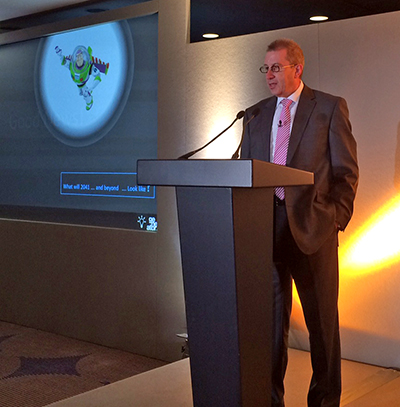RDO7: Imagining the future – timeshare in 2040
Advances in technology will dominate the future, and delegates at the RDO7 conference heard that the timeshare industry not only needs to keep up, but make the most of the opportunities they present.
Today, 60 trillion web pages exist on the internet. In the near future, mankind will produce a universal library, meaning people will be able to carry the entirety of society’s intelligence in their pocket. Steve Pentland, CEO, Generator Systems and Group Impact, gave delegates a crystal ball to see what we can expect from technology in the years to come.
“There are 27 screens produced each year for every baby born. That’s a total of 3.8 billion new screens, each year,” he said.
From computers, to phones, to billboards to tablets, screens are already playing a huge part in our everyday lives. Soon they will be a standard feature on most products including cereal boxes, training shoes, fridges – even our newspapers will change. Each of these adverts will be responsive, using tracking to determine our emotions, our habits and our decisions in the same way that online adverts do today.

Steve Pentland at RDO7
Another reality
Other technological advances also mean we’ll soon be able to control screens using our eyes instead of a mouse, and our everyday contact lenses and glasses will act as the gateway to a world of augmented reality.
Immersive and convincing experiences through augmented reality are the latest phenomenon. The most talked about experience in technology in the last six months is known as ‘The Void’, an immersive virtual reality (VR) theme park based in Utah that transports users to another world they can see, feel, and interact with. It uses a VR headset powered by a supercomputer backpack to craft a magical sensory experience unlike no other.
“Gaming will also deliver on the augmented reality,” Pentland continued. “It’s conceivable that a room in your own home will be dedicated to augmented reality, able to transport you to anywhere you desire.”
Technology today
Marriott is one brand keen to keep ahead of the game. With heavy investment in technology it is buying into the user experience using interactive screens for advertisements to engage with its markets, giving guests the ability to check in and out online and use their mobile phones as room keys.
Technology will also transform our working lives. Telecommuting is an increasingly popular method of working and as communication channels continue to improve, it will be even easier to have virtual meetings.
Drones have had a huge impact and that’s not about to change. Soon they will be delivering parcels to our door and already the US army is using drones the size of insects.
The future
“Scientists will soon discover cures for colds, deafness, migraines, cancer, Alzheimer’s and many other illnesses,” claimed Pentland.
“Nanorobots are currently in the research and development stage – a tiny robot which can be inserted into your bloodstream to provide a dose of medicine directly to the affected area.
“We’ve already seen the invention of the bionic eye to cure blindness after a small camera chip was inserted into the retina of a woman’s eye to help her to see again. Babies born in the last ten years are expected to live to be 120 and those born in the next five years could live to be 200.”
The future truly is unpredictable. In just eight years, Google – which was launched as a search engine – has transformed into a hub for artificial intelligence.
Linking back to the industry, Pentland predicted that travel and holidays will dramatically change. “It will no longer be just about the holiday, relaxing beside the pool. User experience will become essential – which means the industry must be creative to deliver on this.”




